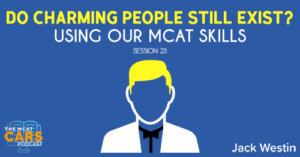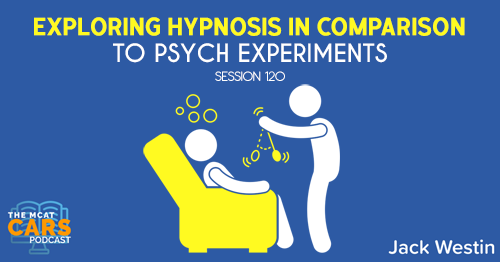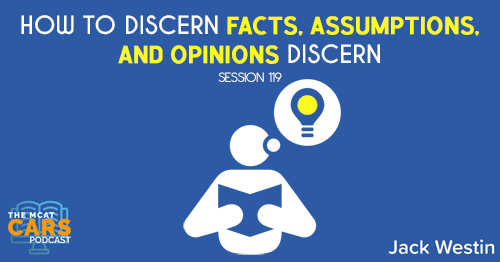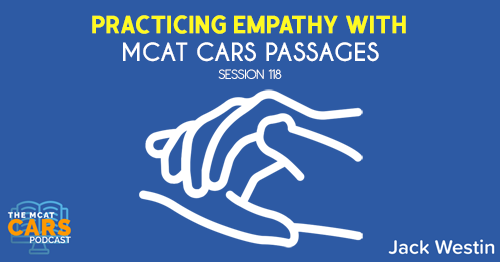Apple Podcasts | Google Podcasts

Session 23
Is the most charming person you know really charming? Follow along and use your MCAT CARS Skills to see if you can define what it means to be charming.
Once again, we’re joined by Jack of JackWestin.com, the leader Be sure to also check all our other podcasts on MedEd Media Network.
Link to article:
When a few years ago I decided to write a book about charm, I began asking friends and acquaintances if they could name five people in contemporary public life—in show business, television journalism, politics, sports—they thought charming. None could do it. Some couldn’t name one. Many of the names that did come up seemed easily disqualified. Someone mentioned Tom Hanks. Nice enough as far as one knows, but charming, no. Another mentioned Oprah. Immensely famous, perhaps the most famous person in the country, but charming—I didn’t think so. The same few names came sputtering out: Steve Martin, Lady Gaga, Bill Murray, Meryl Streep, Paul McCartney, talented people all but scarcely charming.
If I had asked this same question 50 or 60 years ago, the names would have come cascading out: Cary Grant, Katharine Hepburn, Ronald Colman, Myrna Loy, Jack Benny, William Powell, Barbara Stanwyck, Yogi Berra, and on and on into the night, all people about whose charm one could be assured to get an immediate consensus. What, during the intervening years, has happened to in effect all but put charm out of business in our time?
When I batted down some of these candidates for the golden circle, a discussion of the definition of charm often followed. A surprising number of the people I talked with conflated charm with “charisma,” though their definitions of that vogue word generally turned out to be far from clear. Charisma is one of those words that most people use to mean whatever they want it to mean. (“When I use a word,” says Humpty Dumpty in Through the Looking-Glass, “it means just what I choose it to mean—neither more nor less.”) For the people at Avon, Charisma is the name of a perfume. It is the first name of an actress in a television series about vampires. What charisma really means, as set out by the German social scientist Max Weber, is authority “resting on devotion to the exceptional sanctity, heroism, or exemplary character of an individual” that shows up not in pleasing conversation but on the world stage. Jesus had charisma; so, too, did Napoleon, Gandhi, and a very few others, not including Charlie Chaplin, Buster Keaton, or Laurel and Hardy, who, each in his own way, had great charm, but no charisma whatsoever.
Some people I talked with thought charm was synonymous with “cool.” In fact, the two, charm and cool, are all but opposed. Cool aims for detachment, distance; charm is social, bordering on the intimate. Cool is icy; charm warm. Cool is costive; charm often ebullient. Cool doesn’t require approval; charm hopes to win it. Cool began life in jazz under the great saxophonist Lester Young, who first used the term, but it soon descended to the argot of drugs. Cool gave way to hip and hep. In Dave Frishberg’s song “I’m Hip,” the singer proclaims that he watches “arty French flicks with [his] shades on” and is so hip “I call my girlfriend ‘Man.’ ” Miles Davis was cool, Louis Armstrong charming.
Nor is charm the same as style. Many charming people have distinctive styles, but there is no one style that marks the charming. Style, V. S. Naipaul thought, was ultimately a way of looking at the world, which suggests the immense variety of available styles: dark, complex, cheerful. Some styles are, of course, more winning, richer, grander, more interesting than others, and to the extent that they are so the more likely they are to contribute to a person’s charm. Some styles are charming; some charm is stylish. Nevertheless, the two remain distinct.
[01:50] A Brief Background About Today’s Passage
This week, we’re going to look at the passage that depends on interpretation – how the author sees things and view different problems. In this case, we’re going to tackle how the author defines something. However, what many students don’t realize is that definitions are not necessarily consistent. We define things based on our experiences or how we see a word is used in different context. This passage is a good example of how different things can be defined differently.
[03:07] Paragraph 1, Sentence 1
When a few years ago I decided to write a book about charm, I began asking friends and acquaintances if they could name five people in contemporary public life—in show business, television journalism, politics, sports—they thought charming.
Jack says:
The author is talking about “charm.” And he started to ask friends and acquaintances if they could name five people in public life and what they thought about “charm.” Who represents charm? How do they view these people? The grammar is a bit off here but we do know it’s about “charm.”
[04:45] Paragraph 1, Sentences 2-3
None could do it. Some couldn’t name one.
Jack says:
The author says that his friends and acquaintances couldn’t name people that are charming.
[05:06] Paragraph 1, Sentences 4-6
Many of the names that did come up seemed easily disqualified. Someone mentioned Tom Hanks. Nice enough as far as one knows, but charming, no.
Jack says:
The author says that they named people but they weren’t charming. Tom Hanks popped up. And it doesn’t hurt to think about what the author is trying to say. So try to play with it. Experience it. Enjoy what you’re reading.
[06:30] Paragraph 1, Sentences 7-8
Another mentioned Oprah. Immensely famous, perhaps the most famous person in the country, but charming—I didn’t think so.
Jack says:
The author is disqualifying this other person, Oprah, as being charming. Famous, but not charming.
[06:46] Paragraph 1, Sentence 9
The same few names came sputtering out: Steve Martin, Lady Gaga, Bill Murray, Meryl Streep, Paul McCartney, talented people all but scarcely charming.
Jack says:
The author is mentioning a lot of names here and according to him, none of these people should be deemed charming. You don’t need to know these personalities, but you should know that they’re probably discussing some kind of contemporary entertainment.
[07:43] Paragraph 2, Sentence 1
If I had asked this same question 50 or 60 years ago, the names would have come cascading out: Cary Grant, Katharine Hepburn, Ronald Colman, Myrna Loy, Jack Benny, William Powell, Barbara Stanwyck, Yogi Berra, and on and on into the night, all people about whose charm one could be assured to get an immediate consensus.
Jack says:
It sounds like the author is saying that personalities back then were charming, but today’s personalities are not.
[08:30] Paragraph 2, Sentence 2
What, during the intervening years, has happened to in effect all but put charm out of business in our time?
Jack says:
The author is questioning why people aren’t charming now? This is something the author believes. He has established what’s going on but the reason isn’t so clear yet.
[09:45] Paragraph 3, Sentence 1
When I batted down some of these candidates for the golden circle, a discussion of the definition of charm often followed.
Jack says:
The terms “batted down” and “golden circle” could be confusing for students. We’re talking about two groups here – the charming group and the group that’s not charming. It seems like the author is describing charm as a positive thing. He’s trying to associate the term with people that are considered “golden” in a society.
Jack challenges students to stop as they encounter sentences they don’t really understand and think about why those were discussed. How do they relate to what they just read? How do these fit into the puzzle?
[12:00] Paragraph 3, Sentence 2
A surprising number of the people I talked with conflated charm with “charisma,” though their definitions of that vogue word generally turned out to be far from clear.
Jack says:
Apparently, the definition of “charisma” is not clear. And it’s not the clearest word to define charm with.
[12:45] Paragraph 3, Sentences 3-4
Charisma is one of those words that most people use to mean whatever they want it to mean. (“When I use a word,” says Humpty Dumpty in Through the Looking-Glass, “it means just what I choose it to mean—neither more nor less.”)
Jack says:
Everybody is using the word differently. The author is mentioning a quote saying that, according to Humpty Dumpty, the definition is however he wants it to mean.
[13:15] Paragraph 3, Sentences 5-6
For the people at Avon, Charisma is the name of a perfume. It is the first name of an actress in a television series about vampires.
Jack says:
The author is mentioning “charisma” is being defined is different ways.
[13:32] Paragraph 3, Sentence 7
What charisma really means, as set out by the German social scientist Max Weber, is authority “resting on devotion to the exceptional sanctity, heroism, or exemplary character of an individual” that shows up not in pleasing conversation but on the world stage.
Jack says:
Here, charisma is defined as something related to heroism. And this is a definition based on what Weber thinks.
[14:54] Paragraph 3, Sentence 8
Jesus had charisma; so, too, did Napoleon, Gandhi, and a very few others, not including Charlie Chaplin, Buster Keaton, or Laurel and Hardy, who, each in his own way, had great charm, but no charisma whatsoever.
Jack says:
The author is comparing people with charisma and those who didn’t. Here, the author implies the people mentioned had charm but they don’t have charisma. So the author suggests that charm is not the same as charisma.
[15:57] Paragraph 4, Sentence 1
Some people I talked with thought charm was synonymous with “cool.”
Jack says:
First, charm was defined in terms of charisma, but charm is not the same as charisma. Now, charm is defined in terms of “cool.” Again, this definition is very fluid and we don’t know what the definition is yet since the author hasn’t really established it yet.
[16:35] Paragraph 4, Sentence 2
In fact, the two, charm and cool, are all but opposed.
Jack says:
The author is saying that charm and cool are different as well.
[16:49] Paragraph 4, Sentence 3
Cool aims for detachment, distance; charm is social, bordering on the intimate.
Jack says:
The author is just setting the two as different. This is what charm is, it’s intimate and social. So this is charm is defined based on what the author is saying. A possible question on the exam would be which of the following is “charm,” so you have to pick something that is intimate and social. They’re going to give you different scenarios or an analogy question. For instance, “based on how the author perceives charm, which of the following would the author agree with” or “which one is most analogous to it.” And they can give you a possible answer choice of a mother caring for their children. They can give you another one that seems to be charming but isn’t really charming as the author defines it – for instance, a great actor who doesn’t look at that audience. Again, you have to know here that charm is intimate. It’s something social. You’re looking for something connected here and that’s what you should go for.
[18:07] Paragraph 4, Sentences 4-5
Cool is icy; charm warm. Cool is costive; charm often ebullient.
Jack says:
The author is differentiating cool and charm. You might not know what ebullient means but the author has already defined charm as something intimate and social. So maybe it has something to do with that.
[19:27] Paragraph 4, Sentence 6
Cool doesn’t require approval; charm hopes to win it.
Jack says:
Another definition is described here.
[19:35] Paragraph 4, Sentence 7
Cool began life in jazz under the great saxophonist Lester Young, who first used the term, but it soon descended to the argot of drugs.
Jack says:
The author is giving a name here and talks about something that has to do with drugs. It’s probably a terminology for drugs.
[20:12] Paragraph 4, Sentence 8
Cool gave way to hip and hep. In Dave Frishberg’s song “I’m Hip,” the singer proclaims that he watches “arty French flicks with [his] shades on” and is so hip “I call my girlfriend ‘Man.’“
Jack says:
The author talks about a song.
[20:42] Paragraph 4, Sentence 9
Miles Davis was cool, Louis Armstrong charming.
Jack says:
Just like the previous paragraph, the author is giving examples of who’s cool versus who’s charming. You actually don’t know what these quotes are exactly saying, but you know that charm and cool are defined in different ways.
[22:04] Paragraph 5, Sentence 1
Nor is charm the same as style.
Jack says:
You already know the big picture so it’s so much easier to read the rest of the paragraph. Never skip a paragraph. Instead, just keep it in mind that they’re probably still talking about how charm is not style.
[22:44] Paragraph 5, Sentence 2
Many charming people have distinctive styles, but there is no one style that marks the charming.
Jack says:
There are charming people with different styles, but there’s not one style which you can say is really charming.
[23:03] Paragraph 5, Sentence 3
Style, V. S. Naipaul thought, was ultimately a way of looking at the world, which suggests the immense variety of available styles: dark, complex, cheerful.
Jack says:
Here’s this one guy that says you look at styles as a way you look the world and there are different ways to do that.
[23:25] Paragraph 5, Sentence 4
Some styles are, of course, more winning, richer, grander, more interesting than others, and to the extent that they are so the more likely they are to contribute to a person’s charm.
Jack says:
Don’t lose track of the big picture. This is one example of a sentence that can throw students off. But the author says that style helps charm. So this might be something that can be associated with charm. But Jack says you can’t take this seriously.
[24:36] Paragraph 5, Sentences 5-6
Some styles are charming; some charm is stylish. Nevertheless the two remain distinct.
Jack says:
The author is still differentiating the two words.
[25:00] What the Entire Passage Means
The passage is all about the definition of charm and what the author interprets as “charm.” It’s not defined as style or charisma. It’s different from cool. There’s a unique identity to charm and the author defines it as intimate, warm, and social. These are the words that you should keep track of since the author really cares about defining charm. Focus on how the author defines charm. And we now know what the author thinks of charm and the MCAT will test us based on those things.
[26:55] Final Thoughts
You have to know the definitions. If the passage is helping you define something then you have to remember those definitions.
Want some more MCAT prep support? Go to JackWestin.com and check out their free CARS daily passages.
Links:
Link to article:
SEARCH SITE
SEARCH SITE
LISTEN FOR FREE











